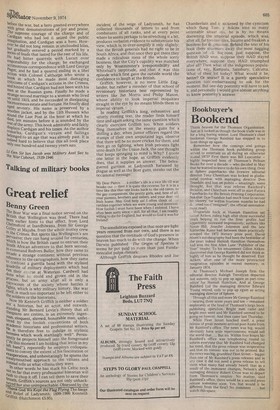Great relief
lienny Green
111.e .Boer War was a final notice served on the taritish that Wellington was dead. There had ?,een earlier hints to that effect, from Lord `--helmsford at Isandhlwana, from Sir George ,olley at Majuba, from the whole motley crew in the Crimea. But spirits like Wellington's are Peryasive; they can hang around for centuries, W,111ch is how the British came to entrust their ?cloth African adventure to that born second i1ri-command Redvers Buller, how they came to nvade a strange continent without previous .,reference to the cartographers, how they came 1-0 confront a guerilla band with the stylised quadrille of military deployments which had 1.tin their conrse at Waterloo. Cardwell had .4rile what he could and grown old in the vrocess, but an army after all is only a Ticrocosm of the society whose battles it ,Ihts, which is why military history, like war irelf, is much too important to be left either to ne soldiers or the historians. .„ Now Mr Kenneth Griffith is neither a soldier or a historian, but an actor, and notwithtsktanding Mr Bernard Levin's theory that all ‘:ilesPians are cretins, is an extremely ingenio t ns, eloquent, shrewd, honorable man, unfet '-ered by the foolish conventions of both ajadernic historians and professional writers. he Is therefore free to indulge in stylistic ttteresies which work startlingly well*. Persisl;ntlY he projects himself into the foreground fAt this moment I am holding that letter in my list hand"), repeatedly he employs colloquia:Ms to convey the extent of his fascination or ttsxasPeration, and unhesitatingly he spurns the mealymouthed approach to the villians and nstead tells us what villains they were. In other words he has stuck his Celtic neck '44 so far that every professional historian will rb1,-1„sh to chop it off. I can tell them to save their 'eath. Griffith's sources are not only unhackilty_e.s1 but also unimpeachable. Obsessed by the arP;ank God We Kept the Flag Flying The Siege Relief of Ladysmith, 1899-1900 Kenneth (Hutchinson £5.95). incident of the seige of Ladysmith, he has collected thousands of letters to and from combatants of all ranks, and at every point where he seems perhaps to be stretching it a bit, produces verbatim evidence to substantiate his view, which is, to over-simplify it only slightly, that the British generals had no right to be in South Africa-, and that once they got there they made a ridiculous mess of the whole sorry business, that the City's cupidity was matched only by Westminster's irresponsibility and Whitehall's ineptitude, and that it was this episode which first gave the outside world the confidence to laugh at the British. Griffith, however, is no mere Little Englander, but rather a member of that school of revisionary historians best represented by writers like Jan Morris and Philip Mason, whose ability to look imperial iniquities straight in the eye by no means blinds them to imperial virtues. In reading Griffith's long, exhaustive and utterly riveting text, the reader finds himself time and again asking the same question which 'clearly exercises Griffith too. When soldiers fling themselves on the enemy guns for a shilling a day, when junior officers regard the stumps of their own amputated legs, observe that there will be no more cricket for them, and then go on fighting, when Irish privates fight unto death for the Union Jack, the one thought that keeps springing to mind is Why? I quote one letter in the hope, as Griffith evidently does, that it supplies an answer. The beleaguered garrison at Ladysmith harassed by plague as well as the Boer guns, sneaks out the occasional message: My Dear Pierce, .. a soldier's life is a nice life till war breaks out .-then it is quite the reverse, for it is in a time like this that one looks back to the old times, to the gay companions, the pretty girls, and, best of all, your parents, brothers and sisters, and your dear -,1d . Irish home. May God help us! I often think of rambles together when we were young and innocent. How foolish I must have been when I enlisted. I have often been sorry since — still, for all that, I am readily willing to die for England, but would to God it was for Ireland!
The sensibilities exposed in that note are light years removed from our own, and there is no question that the certitude of God's presence in heaven has much to do with the change. When Darwin published The Origin of Species it seems he put paid to more than just Fundamentalist pulpit rhetoric. Although Griffith despises Rhodes and Joe Chamberlain and i sickened by the cynicism which flung Torn, y Atkins into so many untenable situat jns; he is by no means disowning the imperial episode, which was, after all, far too complex, bizarre and freakish a business for dcgmatism. Behind the text of his book there murmurs away the most nagging
A
question of . Sul pose, just suppose, the British HAD won, suppose they HAD stayed everywhere, suppose they HAD triumphed after all? Then what of the indigenous populations of, say, Kampala, Salisbury, Calcutta. What of their lot today? What would it be, better? Or worse? It is a purely speculative question too embarrassing to ask for the moment. But one day posterity will have to ask it, and personally I would give almost anything to know posterity's answer.


































 Previous page
Previous page